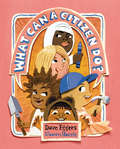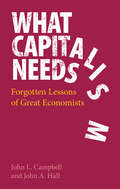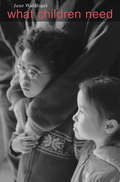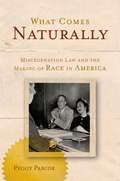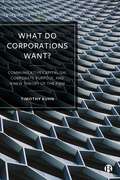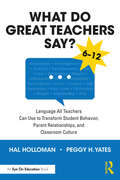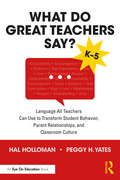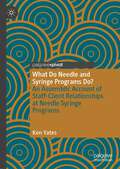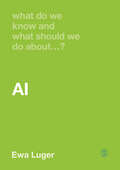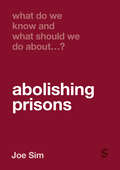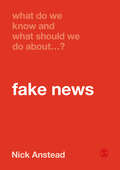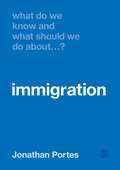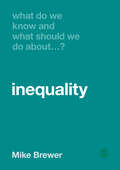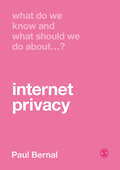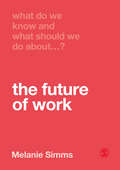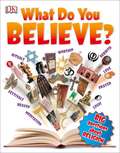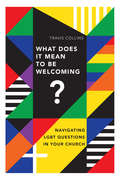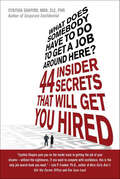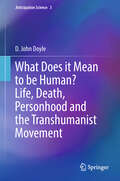- Table View
- List View
What Can a Citizen Do?
by Dave Eggers Shawn HarrisA citizen can pick up litterA citizen can pull a weedA citizen can help that critterA citizen can plant a seedA citizen can aid a neighbor A citizen can join a causeA citizen can write a letterA citizen can help change laws . . .Empowering and timeless, What Can a Citizen Do? is the latest collaboration from the acclaimed duo behind the bestselling Her Right Foot: Dave Eggers and Shawn Harris. This is a book for today's youth about what it means to be a citizen.Across the course of several seemingly unrelated but ultimately connected actions by different children, we watch how kids turn a lonely island into a community—and watch a journey from what the world should be to what the world could be.This is a book about what citizenship—good citizenship—means to you, and to us all.
What Capitalism Needs: Forgotten Lessons of Great Economists
by John A. Hall John L. CampbellFrom unemployment to Brexit to climate change, capitalism is in trouble and ill-prepared to cope with the challenges of the coming decades. How did we get here? While contemporary economists and policymakers tend to ignore the political and social dimensions of capitalism, some of the great economists of the past - Adam Smith, Friedrich List, John Maynard Keynes, Joseph Schumpeter, Karl Polanyi and Albert Hirschman - did not make the same mistake. Leveraging their insights, sociologists John L. Campbell and John A. Hall trace the historical development of capitalism as a social, political, and economic system throughout the twentieth and early twenty-first centuries. They draw comparisons across eras and around the globe to show that there is no inevitable logic of capitalism. Rather, capitalism's performance depends on the strength of nation-states, the social cohesion of capitalist societies, and the stability of the international system - three things that are in short supply today.
What Children Need
by Jane WaldfogelWhat do children need to grow and develop? And how can their needs be met when parents work? Emphasizing the importance of parental choice, quality of care, and work opportunities, economist Jane Waldfogel guides readers through the maze of social science research evidence to offer comprehensive answers and a vision for change. Drawing on the evidence, Waldfogel proposes a bold new plan to better meet the needs of children in working families, from birth through adolescence, while respecting the core values of choice, quality, and work: ,Allow parents more flexibility to take time off work for family responsibilities; ,Break the link between employment and essential family benefits; ,Give mothers and fathers more options to stay home in the first year of life; ,Improve quality of care from infancy through the preschool years; ,Increase access to high-quality out-of-school programs for school-aged children and teenagers.
What Comes Naturally: Miscegenation Law And The Making Of Race In America
by Peggy PascoeA long-awaited history that promises to dramatically change our understanding of race in America, What Comes Naturally traces the origins, spread, and demise of miscegenation laws in the United States-laws that banned interracial marriage and sex, and which were enacted and applied not just in the South but throughout most of the country, in the West, the North, and the Midwest. Beginning in the Reconstruction era, when the term miscegenation first was coined, Peggy Pascoe traces the creation of a racial hierarchy that bolstered white supremacy and banned the marriage of Whites to Chinese, Japanese, Filipinos, and American Indians, as well as the marriage of Whites to Blacks. She takes readers into the lost world of miscegenation law, showing how legislators, lawyers, and judges used ideas about gender and sexuality to enact and enforce miscegenation laws. Judges labeled interracial marriages "unnatural," marriage license clerks made them seem statistically invisible, and newspaper reporters turned them into sensational morality tales. Taken together, their actions embedded a multiracial version of white supremacy deep in the heart of the modern American state. Pascoe ends not simply with the landmark 1967 case of Loving v. Virginia, in which the U. S. Supreme Court finally struck down miscegenation laws, but with a look at the implications of the ideal of colorblindness that replaced them. Moving effortlessly from the lives of interracial couples, the politicking of the NAACP, and the outraged objections of Filipino immigrants to the halls of state legislatures and rulings of the Supreme Court, What Comes Naturally transcends older interpretations of bans on interracial marriage as a southern story in black and white to offer a stunning account of the national scope and multiracial breadth of America's tragic history of miscegenation laws.
What Do Corporations Want?: Communicative Capitalism, Corporate Purpose, and a New Theory of the Firm
by Timothy Kuhn'Corporate purpose' has become a battleground for stakeholders’ competing desires. Some argue that corporations must simply generate profit; others suggest that we must make them create social change.Leading organization studies scholar Timothy Kuhn argues that this 'either/or' thinking dramatically oversimplifies matters: today’s corporations must be many things, all at once.Kuhn offers a bold new Communicative Theory of the Firm to highlight the authority that creates corporations’ identities and activities. The theory provides a roadmap for navigating that battleground of competing desires to produce more responsive corporations.Drawing on communicative and new materialist theorizing, along with three insightful case studies, this book thoroughly redefines our understandings of what corporations are 'for'.
What Do Great Teachers Say?: Language All Teachers Can Use to Transform Student Behavior, Parent Relationships, and Classroom Culture 6-12
by Hal Holloman Peggy H. YatesDo you remember a time when you used the right words at the right moment, and they made all the difference? With the aim of helping you repeat that experience every day, this book provides hundreds of examples of what we call Great Teacher Language, a technique designed to help all teachers use words to transform student behavior and parent relationships. In their years of working at the K-12 levels, educators Hal Holloman and Peggy H. Yates have identified the exact phrases and key words you can use in your classroom to address inappropriate outbursts, a lack of respect and cooperation, student conflict, and more. Great Teacher Language will enable you to transform student behavior, parent relationships, and your classroom culture.The book features 11 Great Teacher Language Word Categories, which you'll learn how to use in terms of self-talk, student talk, and parent talk: Words of Accountability, Words of Encouragement, Words of Grace, Words of Guidance, Words of High Expectations, Words of Hope, Words of Love, Words of Relationships, Words of Respect, Words of Understanding, and Words of Unity.Filled with helpful charts and Great Teacher Language examples, this resource will be one you turn to again and again and will make a transformational difference for your middle and high school students, their parents, and you!
What Do Great Teachers Say?: Language All Teachers Can Use to Transform Student Behavior, Parent Relationships, and Classroom Culture K-5
by Hal Holloman Peggy H. YatesDo you remember a time when you used the right words at the right moment, and they made all the difference? With the aim of helping you repeat that experience every day, this book provides hundreds of examples of what we call Great Teacher Language, a technique designed to help all teachers use words to transform student behavior and parent relationships. In their years of working at the K-12 levels, educators Hal Holloman and Peggy H. Yates have identified the exact phrases and key words you can use in your classroom to address inappropriate outbursts, a lack of respect and cooperation, student conflict, and more. Great Teacher Language will enable you to transform student behavior, parent relationships, and your classroom culture. This book features 11 Great Teacher Language Word Categories, which you'll learn how to use in terms of self-talk, student talk, and parent talk: Words of Accountability, Words of Encouragement, Words of Grace, Words of Guidance, Words of High Expectations, Words of Hope, Words of Love, Words of Relationships, Words of Respect, Words of Understanding, and Words of Unity. Filled with helpful charts and Great Teacher Language examples, this resource will be one you turn to again and again, and will make a transformational difference for your students, your parents, and you!
What Do Needle and Syringe Programs Do?: An Assemblic Account of Staff-Client Relationships at Needle Syringe Programs
by Ken YatesThis book explores the lived experiences of people who interact with needle and syringe program services in Western Sydney, Australia, including participants and industry workers. It locates the research within the wider context of harm reduction and drug policies. It addresses the question "what do needle and syringe programs do?" and seeks to unpack the agency of human and non-human factors to consider the ‘more than human’ effects of these programmes. Alongside a critical materialist perspective used to interpret the empirical findings, the book demonstrates that needle and syringe programs create new possibilities for engaging with the world by changing the material conditions of illicit drug consumption. It draws on the conceptual contributions of post-humanist thinking from assemblage theory, actor-network theory, and cognate scholarship. Consideration is given to transferable findings and insights for international contexts. The book speaks to scholars and postgraduate students in the areas such as sociology, criminology, social work, critical public health, cultural studies, and related fields.
What Do We Know and What Should We Do About AI? (What Do We Know and What Should We Do About:)
by Ewa LugerThe idea of Artificial Intelligence (AI) has taken the world by storm. From fears over killer robots in sci-fi dystopias, to driverless cars in real life, we are both inspired and horrified by the prospect of an advanced intelligence that is not our own. Could AI take over the world? Will it take all of our jobs? Has Google really created a sentient chatbot, and is AI racing towards human intelligence, or is it just horribly misunderstood? These common questions point us towards an unknown and troubling future. What we do know is that we are in the midst of a hype cycle, with huge amounts of funding and focus galvanising progress. Whether AI truly lives up to this hype remains to be seen, but this once niche idea has suddenly evolved into a global multibillion dollar industry. In this short and accessible book, Ewa Luger explains what we mean when we talk about AI, explores how we got here, describes what we are doing about it, where the field is heading, and where we should go next. Written by leading social scientists, the What Do We Know and What Should We Do About...? series offers concise, up-to-date overviews of issues often oversimplified, misrepresented or misunderstood and shows you how to enact change. "Short, sharp and compelling." - Alex Preston, The Observer "If you want to learn a lot about what matters most, in as short a time as possible, this is the series for you."- Danny Dorling, 1971 Professor of Geography, University of Oxford
What Do We Know and What Should We Do About AI? (What Do We Know and What Should We Do About:)
by Ewa LugerThe idea of Artificial Intelligence (AI) has taken the world by storm. From fears over killer robots in sci-fi dystopias, to driverless cars in real life, we are both inspired and horrified by the prospect of an advanced intelligence that is not our own. Could AI take over the world? Will it take all of our jobs? Has Google really created a sentient chatbot, and is AI racing towards human intelligence, or is it just horribly misunderstood? These common questions point us towards an unknown and troubling future. What we do know is that we are in the midst of a hype cycle, with huge amounts of funding and focus galvanising progress. Whether AI truly lives up to this hype remains to be seen, but this once niche idea has suddenly evolved into a global multibillion dollar industry. In this short and accessible book, Ewa Luger explains what we mean when we talk about AI, explores how we got here, describes what we are doing about it, where the field is heading, and where we should go next. Written by leading social scientists, the What Do We Know and What Should We Do About...? series offers concise, up-to-date overviews of issues often oversimplified, misrepresented or misunderstood and shows you how to enact change. "Short, sharp and compelling." - Alex Preston, The Observer "If you want to learn a lot about what matters most, in as short a time as possible, this is the series for you."- Danny Dorling, 1971 Professor of Geography, University of Oxford
What Do We Know and What Should We Do About Abolishing Prisons? (What Do We Know and What Should We Do About:)
by Joe SimThis book challenges the myths and misrepresentations that justify the existence of prisons. It traces the history and failure of prison reform over two centuries, addresses a number of key, contemporary issues and argues for the abolition of prisons. It explores: The problem with liberal reformism. The myths around crime, the prison population and prison regimes. People in prison and the harms they experience. The relationship between prisons, punishment and structural inequality. The case for abolishing prisons. Aimed at students, researchers, grassroots organisations, prisoners’ rights activists, policy makers and anyone interested in social justice, its conclusion is clear; there needs to be fundamental and meaningful change. Prisons, the criminal injustice system and structural inequalities need to be radically transformed and abolished if social justice is to be achieved. Written by leading social scientists, the What Do We Know and What Should We Do About...? series offers concise, up-to-date overviews of issues often oversimplified, misrepresented or misunderstood and shows you how to enact change. "Short, sharp and compelling." - Alex Preston, The Observer "If you want to learn a lot about what matters most, in as short a time as possible, this is the series for you."- Danny Dorling, 1971 Professor of Geography, University of Oxford
What Do We Know and What Should We Do About Fake News? (What Do We Know and What Should We Do About:)
by Nick AnsteadVoters need to be informed to make political decisions, but what if their media diet not only prevents them from getting the information they need, but actively shapes inaccurate perceptions of the world? Drawing on examples and evidence from around the world, this book aims to make a timely intervention to the debate about the concept of fake news. Its underlying argument will have three objectives. First, to offer more precise definitions for a term that is often loosely used. Second, to offer a less technologically determinist view of fake news. New social media platforms, such as Facebook and WhatsApp, are clearly an important part of the story, but they exist in wider social, political and institutional settings. Third, to situate the idea of fake news (and our concern about it) in broader arguments about an ongoing crisis and loss of confidence in liberal democratic institutions. Only with this perspective, it will be argued, can we possibly address the question of what we should do about fake news. Written by leading social scientists, the What Do We Know and What Should We Do About...? series offers concise, up-to-date overviews of issues often oversimplified, misrepresented or misunderstood and shows you how to enact change. "Short, sharp and compelling." - Alex Preston, The Observer "If you want to learn a lot about what matters most, in as short a time as possible, this is the series for you."- Danny Dorling, 1971 Professor of Geography, University of Oxford
What Do We Know and What Should We Do About Fake News? (What Do We Know and What Should We Do About:)
by Nick AnsteadVoters need to be informed to make political decisions, but what if their media diet not only prevents them from getting the information they need, but actively shapes inaccurate perceptions of the world? Drawing on examples and evidence from around the world, this book aims to make a timely intervention to the debate about the concept of fake news. Its underlying argument will have three objectives. First, to offer more precise definitions for a term that is often loosely used. Second, to offer a less technologically determinist view of fake news. New social media platforms, such as Facebook and WhatsApp, are clearly an important part of the story, but they exist in wider social, political and institutional settings. Third, to situate the idea of fake news (and our concern about it) in broader arguments about an ongoing crisis and loss of confidence in liberal democratic institutions. Only with this perspective, it will be argued, can we possibly address the question of what we should do about fake news. Written by leading social scientists, the What Do We Know and What Should We Do About...? series offers concise, up-to-date overviews of issues often oversimplified, misrepresented or misunderstood and shows you how to enact change. "Short, sharp and compelling." - Alex Preston, The Observer "If you want to learn a lot about what matters most, in as short a time as possible, this is the series for you."- Danny Dorling, 1971 Professor of Geography, University of Oxford
What Do We Know and What Should We Do About Immigration? (What Do We Know and What Should We Do About:)
by Jonathan PortesWhat Do We Know and What Should We Do About Immigration? Is part of a new book series offering short, up-to-date overviews of key issues often misrepresented or simplified in the mainstream media. In this book, Professor Jonathan Portes examines the subject of immigration, providing readers with a short history of immigration in the UK, followed by a detailed discussion of ‘What We Know’ about the economic and social impact of immigration. Portes addresses commonly asked questions such as: Does immigration reduce job opportunities for those born in the UK, or push down wages? What is the impact of immigration on the public finances and public services? What has the impact of free movement of people been, both in the UK and the rest of the EU? The author concludes by suggesting ‘What We Should Do” about immigration, investigating what a post-Brexit immigration system should look like, and what – if anything – do we need to promote integration? Intended for anyone seeking a quick and authoritative understanding of immigration in the UK. Series Editor: Professor Chris Grey, Royal Holloway, University of London
What Do We Know and What Should We Do About Immigration? (What Do We Know and What Should We Do About:)
by Jonathan Portes"A short, sharp and compelling book." The Observer At a time when immigration has once again become a deeply contentious political issue, Jonathan Portes provides some much-needed clarity, taking on misinformation and inaccurate reporting to reveal the true economic and social impact of immigration to the UK. This important book covers a short history of immigration to the UK, uses the latest research and data to summarise how it is financially beneficial to the economy, considers it′s positive effects on contemporary society, and provides straightforward answers to commonly asked questions such as: does immigration push down wages? Does it reduce job opportunities for those born in the UK? And what impact does it have on the NHS and other public services? Portes then proposes what we should do about immigration, defining what a post-Brexit system should look like, and outlining what, if anything, we should do to promote integration further. Written by leading social scientists, the What Do We Know and What Should We Do About...? series offers concise, up-to-date overviews of issues often oversimplified, misrepresented or misunderstood and shows you how to enact change. "If you want to learn a lot about what matters most, in as short a time as possible, this is the series for you."- Danny Dorling, 1971 Professor of Geography, University of Oxford
What Do We Know and What Should We Do About Inequality? (What Do We Know and What Should We Do About:)
by Professor Mike BrewerWhat Do We Know and What Should We Do About Inequality? is part of a new book series offering short, up-to-date overviews of key issues often misrepresented or simplified in the mainstream media. In this book, Professor Mike Brewer discusses "What We Know" about economic inequalities in the UK, presenting new analysis of the top 1% and 0.1% in the UK, and summarising the causes and consequences of high levels of inequality. Brewer answers the following questions: Why is curbing inequality now regarded as a global challenge? Why did the UK become more unequal during the 1980s? What has happened to incomes since the financial crash in 2008 and the government austerity that followed? How relevant is Thomas Piketty's prediction that growing wealth inequalities will return us to levels of inequality last seen at the dawn of the twentieth century? The author concludes by suggesting "What We Should Do" to move the UK off its high-inequality path, including further taxation, wealth redistribution and welfare reform. Intended for anyone seeking a quick and authoritative understanding of inequality in the modern era. Series Editor: Professor Chris Grey, Royal Holloway, University of London
What Do We Know and What Should We Do About Inequality? (What Do We Know and What Should We Do About:)
by Professor Mike BrewerWhat Do We Know and What Should We Do About Inequality? is part of a new book series offering short, up-to-date overviews of key issues often misrepresented or simplified in the mainstream media. In this book, Professor Mike Brewer discusses "What We Know" about economic inequalities in the UK, presenting new analysis of the top 1% and 0.1% in the UK, and summarising the causes and consequences of high levels of inequality. Brewer answers the following questions: Why is curbing inequality now regarded as a global challenge? Why did the UK become more unequal during the 1980s? What has happened to incomes since the financial crash in 2008 and the government austerity that followed? How relevant is Thomas Piketty's prediction that growing wealth inequalities will return us to levels of inequality last seen at the dawn of the twentieth century? The author concludes by suggesting "What We Should Do" to move the UK off its high-inequality path, including further taxation, wealth redistribution and welfare reform. Intended for anyone seeking a quick and authoritative understanding of inequality in the modern era. Series Editor: Professor Chris Grey, Royal Holloway, University of London
What Do We Know and What Should We Do About Internet Privacy? (What Do We Know and What Should We Do About:)
by Paul BernalPrivacy on the internet is challenged in a wide variety of ways - from large social media companies, whose entire business models are based on privacy invasion, through the developing technologies of facial recognition, to the desire of governments to monitor our every activity online. But the impact these issues have on our daily lives is often underplayed or misunderstood. In this book, Paul Bernal analyses how the internet became what it is today, exploring how the current manifestation of the internet works for people, for companies and even for governments, with reference to the new privacy battlefields of location and health data, the internet of things and the increasingly contentious issue of personal data and political manipulation. The author then proposes what we should do about the problems surrounding internet privacy, such as significant changes in government policy, a reversal of the current ‘war’ on encryption, being brave enough to take on the internet giants, and challenging the idea that ‘real names’ would improve the discourse on social networks. Written by leading social scientists, the What Do We Know and What Should We Do About...? series offers concise, up-to-date overviews of issues often oversimplified, misrepresented or misunderstood and shows you how to enact change. "Short, sharp and compelling." - Alex Preston, The Observer "If you want to learn a lot about what matters most, in as short a time as possible, this is the series for you."- Danny Dorling, 1971 Professor of Geography, University of Oxford
What Do We Know and What Should We Do About Internet Privacy? (What Do We Know and What Should We Do About:)
by Paul BernalPrivacy on the internet is challenged in a wide variety of ways - from large social media companies, whose entire business models are based on privacy invasion, through the developing technologies of facial recognition, to the desire of governments to monitor our every activity online. But the impact these issues have on our daily lives is often underplayed or misunderstood. In this book, Paul Bernal analyses how the internet became what it is today, exploring how the current manifestation of the internet works for people, for companies and even for governments, with reference to the new privacy battlefields of location and health data, the internet of things and the increasingly contentious issue of personal data and political manipulation. The author then proposes what we should do about the problems surrounding internet privacy, such as significant changes in government policy, a reversal of the current ‘war’ on encryption, being brave enough to take on the internet giants, and challenging the idea that ‘real names’ would improve the discourse on social networks. Written by leading social scientists, the What Do We Know and What Should We Do About...? series offers concise, up-to-date overviews of issues often oversimplified, misrepresented or misunderstood and shows you how to enact change. "Short, sharp and compelling." - Alex Preston, The Observer "If you want to learn a lot about what matters most, in as short a time as possible, this is the series for you."- Danny Dorling, 1971 Professor of Geography, University of Oxford
What Do We Know and What Should We Do About the Future of Work? (What Do We Know and What Should We Do About:)
by Melanie SimmsWhat Do We Know and What Should We Do About The Future of Work? is part of a new book series offering short, up-to-date overviews of key issues often misrepresented or simplified in the mainstream media. In this book, Professor Melanie Simms analyses ‘What We Know’ about the current state of paid employment in the UK and provides a far-ranging examination of the most pressing issues facing traditional employment, such as: The rise of automation Robotics and artificial intelligence Platform capitalism The Universal Basic Income The challenges of demographic change The author concludes by suggesting ‘What We Should Do' – identifying four main areas that would have to be strengthened, in order to deliver a society and economy with more and better jobs. Intended for anyone seeking a quick and authoritative understanding of the future of work in the UK. Series Editor: Professor Chris Grey, Royal Holloway, University of London
What Do We Know and What Should We Do About the Future of Work? (What Do We Know and What Should We Do About:)
by Melanie Simms"An excellent summary of why and how we work." People Management magazine What do we know about the current state of work and employment and what does the future of work look like? Professor Melanie Simms provides a far-reaching overview of paid employment in the UK, examining why we work, how we work, and what the future of work will be like with changing demographics and the introduction of modern technologies. From zero-hour contracts, the gig economy and universal basic income, to automation, robotics and artificial intelligence, Simms analyses the most pressing issues facing traditional employment. Before outlining four priority areas where the UK should look to strengthen regulation of in order to face the coming challenges more effectively, but also, so that they benefit workers, as well as employers and managers. Written by leading social scientists, the What Do We Know and What Should We Do About...? series offers concise, up-to-date overviews of issues often oversimplified, misrepresented or misunderstood and shows you how to enact change. "Short, sharp and compelling." - Alex Preston, The Observer "If you want to learn a lot about what matters most, in as short a time as possible, this is the series for you."- Danny Dorling, 1971 Professor of Geography, University of Oxford
What Do You Believe? (Big Questions)
by Dorling Kindersley Publishing StaffReligion, morality, science, and the afterlife are complex and often misunderstood subjects. What Do You Believe? is a dynamic and clear text that brings together a variety of ideas of on religion. They are clearly presented for children to understand in a clear, unbiased text, and key concepts are broken down into manageable chunks of information with keywords that are simply explained. What Do You Believe? looks at basic teachings, practices of world faiths, philosophy, and more, and delves into the meaning and purpose of life. This book promotes understanding, tolerance, and respect for people whatever they believe.
What Does It Mean to Be Welcoming?: Navigating LGBT Questions in Your Church
by Travis Collins16th Annual Outreach Magazine Resource of the Year - Social Issues/JusticeWhat Does It Mean to Be Welcoming?
What Does Somebody Have to Do to Get a Job Around Here?: 44 Insider Secrets That Will Get You Hired
by Cynthia ShapiroIf you are looking for a job you need every advantage you can get. What Does Somebody Have to Do to Get a Job Around Here? puts a former Human Resources executive turned employee advocate in your corner. Cynthia Shapiro reveals the best-kept job secrets that employers don't want you to know including:*Secret #8: A computer is deciding your job prospects.*Secret #12: Professional references are useless.*Secret #18: There is a "type" that always gets the offer.*Secret #21: The Thank-You note is too late.*Secret #28: Always negotiate.* …and thirty-nine more!Once you know the secrets you can create a winning resume, ace the interview, and land the job of your dreams.
What Does it Mean to be Human? Life, Death, Personhood and the Transhumanist Movement (Anticipation Science #3)
by D. John DoyleThis book is a critical examination of the philosophical and moral issues in relation to human enhancement and the various related medical developments that are now rapidly moving from the laboratory into the clinical realm. In the book, the author critically examines technologies such as genetic engineering, neural implants, pharmacologic enhancement, and cryonic suspension from transhumanist and bioconservative positions, focusing primarily on moral issues and what it means to be a human in a setting where technological interventions sometimes impact strongly on our humanity. The author also introduces the notion that death is a process rather than an event, as well as identifies philosophical and clinical limitations in the contemporary determination of brain death as a precursor to organ procurement for transplantation. The discussion on what exactly it means to be dead is later applied to explore philosophical and clinical issues germane to the cryonics movement. Written by a physician/ scientist and heavily referenced to the peer-reviewed medical and scientific literature, the book is aimed at advanced students and academics but should be readable by any intelligent reader willing to carry out some side-reading. No prior knowledge of moral philosophy is assumed, as the various key approaches to moral philosophy are outlined early in the book.
